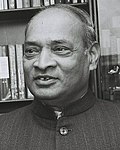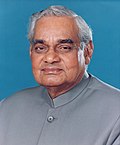| Portrait | Minister
(Birth-Death)
Constituency | Term of office | Political party | Ministry | Prime Minister |
|---|
| From | To | Period |
|---|
| Minister of State for Rural Reconstruction |
|---|
| | R. V. Swaminathan
MP for Sivaganga | 24 November 1980 | 23 January 1982 | 2 years, 3 days | Indian National Congress | Indira IV | | Indira Gandhi |
| | Baleshwar Ram
(1928–2015)
MP for Rosera | 16 January 1982 | 23 January 1982 | 7 days |
| Minister of State for Rural Development |
|---|
| | R. V. Swaminathan
MP for Sivaganga | 23 January 1982 | 29 January 1983 | 1 year, 6 days | Indian National Congress | Indira IV | | Indira Gandhi |
| | Baleshwar Ram
(1928–2015)
MP for Rosera |
|  | Gaddam Venkatswamy
(1929–2014)
MP for Peddapalli | 21 June 1991 | 2 July 1992 | 1 year, 42 days | Indian National Congress | Rao | | P. V. Narasimha Rao |
| | Uttambhai Patel
(1927–2018)
MP for Valsad |
|  | Gaddam Venkatswamy
(1929–2014)
MP for Peddapalli
Minister of State, Rural Development | 2 July 1992 | 18 January 1993 | 200 days |
| | Uttambhai Patel
(1927–2018)
MP for Valsad
Minister of State, Rural Development | 2 July 1992 | 11 June 1995 | 2 years, 344 days |
| | Colonel
Rao Ram Singh (Retd.)
(1925–2012)
MP for Mahendragarh
Minister of State, Wasteland Development | 2 July 1992 | 11 June 1995 | 2 years, 344 days |
|  | Rameshwar Thakur
(1925–2015)
Rajya Sabha MP for Bihar
Minister of State, Rural Development | 18 January 1993 | 22 December 1994 | 1 year, 338 days |
| Minister of State for Rural Areas and Employment |
|---|
| | Uttambhai Patel
(1927–2018)
MP for Valsad
Minister of State, Rural Development | 11 June 1995 | 16 May 1996 | 340 days | Indian National Congress | Rao | | P. V. Narasimha Rao |
| | Colonel
Rao Ram Singh (Retd.)
(1925–2012)
MP for Mahendragarh
Minister of State, Wasteland Development | 11 June 1995 | 30 March 1996 | 293 days |
| 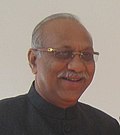 | Vilas Muttemwar
(born 1949)
MP for Nagpur
Minister of State, Rural Employment and Poverty Alleviation | 15 September 1995 | 16 May 1996 | 244 days |
| | Chandradeo Prasad Verma
(1921–2005)
MP for Arrah | 1 June 1996 | 19 March 1998 | 1 year, 291 days | Janata Dal | Deve Gowda | | H. D. Deve Gowda |
| Gujral | | Inder Kumar Gujral |
| Minister of State for Rural Development |
|---|
|  | A. Raja
(born 1963)
MP for Perambalur | 13 October 1999 | 30 September 2000 | 353 days | Dravida Munnetra Kazhagam | Vajpayee III | | Atal Bihari Vajpayee |
| | Subhash Maharia
(born 1957)
MP for Sikar | 13 October 1999 | 29 January 2003 | 3 years, 108 days | Bharatiya Janata Party |
|  | Rita Verma
(born 1953)
MP for Dhanbad | 30 September 2000 | 1 September 2001 | 336 days |
| | Annasaheb M. K. Patil
(born 1939)
MP for Erandol | 1 September 2001 | 22 May 2004 | 2 years, 264 days |
|  | Krishnam Raju
(1940–2022)
MP for Narasapuram | 29 January 2003 | 22 May 2004 | 1 year, 114 days |
|  | Suryakanta Patil
(born 1948)
MP for Hingoli | 23 May 2004 | 22 May 2009 | 4 years, 364 days | Nationalist Congress Party | Manmohan I | | Manmohan Singh |
|  | Ale Narendra
(1946–2014)
MP for Medak | 23 May 2004 | 24 August 2006 | 2 years, 93 days | Telangana Rashtra Samithi |
|  | Chandra Sekhar Sahu
(born 1950)
MP for Berhampur | 24 October 2006 | 22 May 2009 | 2 years, 210 days | Indian National Congress |
| 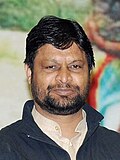 | Pradeep Jain Aditya
(born 1962)
MP for Jhansi | 28 May 2009 | 26 May 2014 | 4 years, 363 days | Manmohan II |
|  | Sisir Adhikari
(born 1941)
MP for Kanthi | 28 May 2009 | 22 September 2012 | 3 years, 117 days | Trinamool Congress |
|  | Agatha Sangma
(born 1980)
MP for Tura | 28 May 2009 | 27 October 2012 | 3 years, 152 days | Nationalist Congress Party |
|  | Lalchand Kataria
(born 1968)
MP for Jaipur Rural | 31 October 2012 | 26 May 2014 | 1 year, 146 days | Indian National Congress | Manmohan II |
|  | Upendra Kushwaha
(born 1960)
MP for Karakat | 27 May 2014 | 9 November 2014 | 167 days | Rashtriya Lok Samta Party | Modi I | | Narendra Modi |
|  | Sudarshan Bhagat
(born 1969)
MP for Lohardaga | 9 November 2014 | 5 July 2016 | 1 year, 239 days | Bharatiya Janata Party |
|  | Ram Kripal Yadav
(born 1957)
MP for Pataliputra | 5 July 2016 | 30 May 2019 | 2 years, 329 days |
|  | Niranjan Jyoti
(born 1967)
MP for Fatehpur | 31 May 2019 | 9 June 2024 | 5 years, 9 days | Modi II |
| 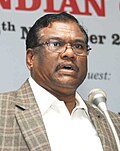 | Faggan Singh Kulaste
(born 1959)
MP for Mandla | 7 July 2021 | 9 June 2024 | 2 years, 338 days |
|  | Kamlesh Paswan
(born 1976)
MP for Bansgaon | 10 June 2024 | Incumbent | 1 year, 230 days | Modi III |
|  | Chandra Sekhar Pemmasani
(born 1976)
MP for Guntur | Telugu Desam Party |
|






